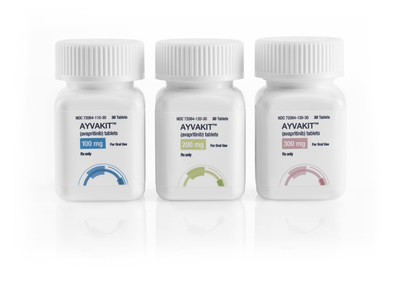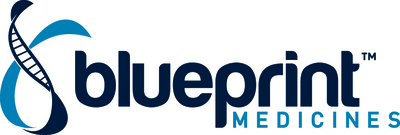Blueprint Medicines Announces FDA Approval of AYVAKIT™ (avapritinib) for the Treatment of Adults with Unresectable or Metastatic PDGFRA Exon 18 Mutant Gastrointestinal Stromal Tumor


The
GIST is a rare, genomically driven sarcoma of the gastrointestinal (GI) tract. Approximately 6 percent of patients with newly diagnosed GIST have PDGFRA exon 18 mutations. The most common PDGFRA exon 18 mutation is the D842V mutation, which is resistant to all other approved therapies. A retrospective study showed that when these patients were treated with imatinib, they had an ORR of 0 percent.2
"Today's approval of AYVAKIT brings forward a new standard of care for patients with PDGFRA exon 18 mutant GIST, a genomically defined population that previously had very limited treatment options. For the first time, we can offer these patients a highly effective treatment that targets the underlying genetic cause of their disease," said
"The full approval of AYVAKIT based on robust data from our Phase 1 NAVIGATOR clinical trial is an incredibly exciting milestone for our company and, more importantly, for GIST patients with a PDGFRA exon 18 mutation, who have been waiting for a new treatment option," said
Conference Call Information
Blueprint Medicines will host a live webcast beginning at 4:30 p.m. ET today to discuss the
Update on New Drug Application for the Treatment of Fourth-Line GIST
AYVAKIT Efficacy and Safety Data1
The efficacy of AYVAKIT was established from 43 patients in the NAVIGATOR trial with unresectable or metastatic GIST harboring PDGFRA exon 18 mutations, including 38 patients with PDGFRA D842V mutations. These patients were treated at starting doses of either 300 mg once daily (QD) or 400 mg QD. Efficacy data were evaluated by blinded, independent central radiology review, based on modified Response Evaluation Criteria in Solid Tumors version 1.1 (mRECIST 1.1 criteria) for GIST. The recommended dose of AYVAKIT is 300 mg QD. AYVAKIT is available in 100 mg, 200 mg and 300 mg dose strengths.
AYVAKIT demonstrated durable responses in patients with PDGFRA exon 18 mutations across multiple lines of treatment. In these patients, the ORR was 84 percent [7 percent complete responses (CR), 77 percent partial responses (PR)]. In patients with PDGFRA D842V mutations, the ORR was 89 percent (95% CI: 75%, 97%; 8 percent CR, 82 percent PR). The median DOR was not reached in either patient population (range: 1.9+ months, 20.3+ months).
The safety of AYVAKIT in patients with unresectable or metastatic GIST was evaluated in 204 patients who received 300 mg QD or 400 mg QD dosing in the NAVIGATOR trial. Patients were heavily pre-treated, with patients receiving a median of three prior kinase inhibitors (range: 0 to 7).
There are no contraindications for AYVAKIT. AYVAKIT has warnings and precautions of intracranial hemorrhage, central nervous system effects and embryo-fetal toxicity. The most common adverse reactions (≥20 percent) were edema, nausea, fatigue/asthenia, cognitive impairment, vomiting, decreased appetite, diarrhea, hair color changes, increased lacrimation, abdominal pain, constipation, rash and dizziness.
About AYVAKIT (avapritinib)
AYVAKIT (avapritinib) is a kinase inhibitor approved by the
Avapritinib is not approved for the treatment of any other indication in the U.S. or any other jurisdiction by the
About GIST
GIST is a sarcoma, or tumor of bone or connective tissue, of the GI tract. Tumors arise from cells in the wall of the GI tract and occur most often in the stomach or small intestine. Most patients are diagnosed between the ages of 50 to 80, and diagnosis is typically triggered by GI bleeding, incidental findings during surgery or imaging and, in rare cases, tumor rupture or GI obstruction.
Most GIST cases are caused by mutations in KIT or PDGFRA that force protein kinases into an increasingly active state. Because other available therapies primarily bind to the inactive protein conformations, certain primary and secondary mutations typically result in treatment resistance and lead to disease progression.
In unresectable or metastatic GIST, clinical benefits from existing treatments can vary by mutation type. Mutational testing is critical to tailor therapy to the underlying disease driver and is recommended in expert guidelines. Currently, there are no approved therapies for patients with KIT-driven GIST whose disease progresses beyond imatinib, sunitinib and regorafenib. In patients with advanced PDGFRA D842V-driven GIST treated with imatinib, a retrospective study showed an ORR of 0 percent.2
Important Safety Information
Intracranial hemorrhage (e.g., subdural hematoma, intracranial hemorrhage, and cerebral hemorrhage) occurred in 1% of 267 patients (0.7% Grade 3 or 4) with GIST and overall in 3% of 335 patients (1.2% Grade 3 or 4) who received AYVAKIT. Overall, 0.9% of patients receiving AYVAKIT required permanent discontinuation for an intracranial hemorrhage. Withhold AYVAKIT and then resume at a reduced dose upon resolution, or permanently discontinue AYVAKIT based on severity.
In 335 patients receiving AYVAKIT, CNS adverse reactions occurred overall in 58% of patients including cognitive impairment (41%; 3.6% Grade 3 or 4), dizziness (20%; 0.6% Grade 3 or 4), sleep disorders (15%; 0.3% Grade 3 or 4), mood disorders (13%; 1.5% Grade 3 or 4), speech disorders (6%; none Grade 3 or 4), and hallucinations (2.1%; none Grade 3 or 4). Overall, 3.9% of patients required permanent discontinuation of AYVAKIT for a CNS adverse reaction. Depending on severity, withhold AYVAKIT and then resume at the same dose or at a reduced dose upon improvement, or permanently discontinue AYVAKIT.
AYVAKIT can cause fetal harm when administered to a pregnant woman. Advise females of reproductive potential and pregnant women of the potential risk to a fetus. Advise females and males of reproductive potential to use an effective method of contraception during treatment with AYVAKIT and for 6 weeks after the final dose of AYVAKIT. Advise women not to breastfeed during treatment with AYVAKIT and for two weeks after the final dose. Advise females and males of reproductive potential that AYVAKIT may impair fertility.
In 204 patients with unresectable or metastatic GIST, the most common adverse reactions (≥ 20%) were edema, nausea, fatigue/asthenia, cognitive impairment, vomiting, decreased appetite, diarrhea, hair color changes, increased lacrimation, abdominal pain, constipation, rash and dizziness.
Avoid coadministration of AYVAKIT with strong and moderate CYP3A inhibitors. If coadministration with a moderate CYP3A inhibitor cannot be avoided, reduce dose of AYVAKIT. Avoid coadministration of AYVAKIT with strong and moderate CYP3A inducers.
Please click here to see the full Prescribing Information for AYVAKIT.
About
Blueprint Medicines is a precision therapy company striving to improve human health. With a focus on genomically defined cancers, rare diseases and cancer immunotherapy, we are developing transformational medicines rooted in our leading expertise in protein kinases, which are proven drivers of disease. Our uniquely targeted, scalable approach empowers the rapid design and development of new treatments and increases the likelihood of clinical success. We have one
Cautionary Note Regarding Forward-Looking Statements
This press release contains forward-looking statements within the meaning of the Private Securities Litigation Reform Act of 1995, as amended, including, without limitation, statements regarding
References
1 AYVAKIT™ (avapritinib) Prescribing Information (U.S.).
2 Cassier PA, Fumagalli E, Rutkowski P., et al. Outcome of patients with platelet-derived growth factor receptor alpha-mutated gastrointestinal stromal tumors in the tyrosine kinase inhibitor era.

![]() View original content to download multimedia:http://www.prnewswire.com/news-releases/blueprint-medicines-announces-fda-approval-of-ayvakit-avapritinib-for-the-treatment-of-adults-with-unresectable-or-metastatic-pdgfra-exon-18-mutant-gastrointestinal-stromal-tumor-300984629.html
View original content to download multimedia:http://www.prnewswire.com/news-releases/blueprint-medicines-announces-fda-approval-of-ayvakit-avapritinib-for-the-treatment-of-adults-with-unresectable-or-metastatic-pdgfra-exon-18-mutant-gastrointestinal-stromal-tumor-300984629.html
SOURCE
Investor Relations Contact, Kristin Hodous, 617-714-6674, ir@blueprintmedicines.com; Media Relations Contact, Andrew Law, 617-844-8205, media@blueprintmedicines.com
